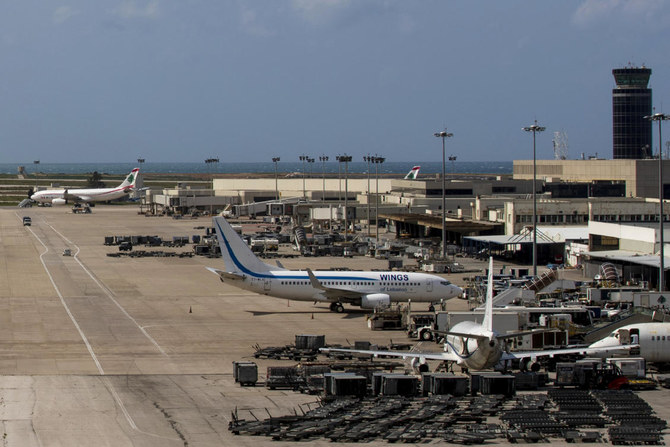BEIRUT: Lebanon will construct a $122 million terminal at Beirut’s Rafik Hariri International Airport to be operated by a leading Irish airport company when it’s completed in four years, officials said Monday.
Lebanon’s only international airport had a major facelift after the country’s 1975-90 civil war and has been working at full capacity for years. The airport has not undergone an expansion since 1998.
Caretaker Minister of Public Works and Transport Ali Hamie said Terminal 2 will bring in private sector investments worth $122 million and will handle 3.5 million passengers annually when operations begin in 2027. It will add six docking stands as well as remote ones, he said in a ceremony at government headquarters to announce the launch of the new terminal.
Terminal 2 will be built where the airport’s old cargo building used to stand, according to Hamie.
The project comes as Lebanon is in the throes of its worst economic and financial crisis in its modern history, rooted in decades of corruption and mismanagement by the country’s political class.
“The project opens more horizons for air aviation between Lebanon and the world,” caretaker Prime Minister Najib Mikati said. He added that it will help in solving several problems, including crowding at the current terminal.
The project will create 500 direct jobs and 2,000 related jobs, Hamie said, adding that Terminal 2 will be for chartered and low-cost flights.
Hamie said once Terminal 2 is ready it will be operated by leading European company daa International, an airport company in Ireland.
Ireland’s Minister of State James Browne attended Monday’s ceremony in Beirut and was quoted in a statement released by the Lebanese prime minister’s office as saying that the contract signed will deepen business relations between the two countries.
The airport currently handles 8 million passengers a year, and the plans are to reach 20 million in 2030, according to the website of national carrier Middle East Airlines.
Lebanon’s economic crisis that began in October 2019 has left three quarters of the country’s 6 million people, including 1 million Syrian refugees, in poverty. The Lebanese pound has lost more than 95 percent of its value.
Lebanon to construct new terminal at Beirut airport
https://arab.news/vcsdq
Lebanon to construct new terminal at Beirut airport

- Lebanon’s only international airport had a major facelift after the country’s 1975-90 civil war and has been working at full capacity for years
- The airport has not undergone an expansion since 1998
Syrian government announces ceasefire in Aleppo

- Syrian government forces have been fighting the Kurdish-led SDF force in Aleppo, where at least 21 people have been killed in several days of clashes
DAMASCUS: Damascus: Syria’s defense ministry announced a ceasefire in several neighborhoods of Aleppo on Friday after days of deadly clashes with Kurdish fighters.
“To prevent any slide toward a new military escalation within residential neighborhoods, the Ministry of Defense announces ... a ceasefire in the vicinity of the Sheikh Maqsoud, Alashrafieh, and Bani Zeid neighborhoods of Aleppo, effective from 3:00 am,” the ministry wrote in a statement.
Syrian government forces have been fighting the Kurdish-led SDF force in Aleppo, where at least 21 people have been killed in several days of clashes.
Both sides have traded blame over who started the clashes on Tuesday, which comes as implementation stalls on a deal to merge the Kurds’ administration and military into the government.
The worst violence in Aleppo since Syria’s Islamist authorities took power has also highlighted regional tensions between Damascus ally Turkiye and Israel, which condemned what it described as attacks against the Kurds.














